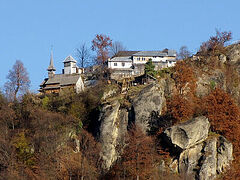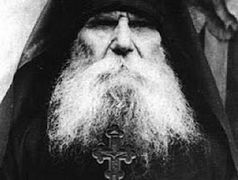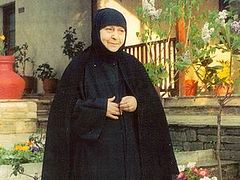In 2017, the Romanian Orthodox Church canonized Blessed George Lazar (1864-1916). A simple peasant who knew the entire Psalter by heart and recited it every single day, he would go around the surrounding area daily with cross in hand, pressing the Psalter to his heart, always barefoot and without a hat in any weather. He would speak a word of God to those he met, help everyone however he could, and pray every night until morning in church. He was greatly loved by the people, and he brought up an entire firmament of remarkable monastics.
 Blessed George with his disciple Archimandrite Mina (Prodan; 1883-1970), abbot of Vovidenia Skete “Not far from Sihastria Monastery, Elder George dug himself a hole where he would hide for prayer, so as not to see anything but the sky. Returning to the monastery, overflowing with grace, he would say to Ioanichie (Moroi): ‘Today I was in Heaven,’” writes Archpriest Dumitru Staniloae.
Blessed George with his disciple Archimandrite Mina (Prodan; 1883-1970), abbot of Vovidenia Skete “Not far from Sihastria Monastery, Elder George dug himself a hole where he would hide for prayer, so as not to see anything but the sky. Returning to the monastery, overflowing with grace, he would say to Ioanichie (Moroi): ‘Today I was in Heaven,’” writes Archpriest Dumitru Staniloae.
Among the most famous disciples of St. George the Pilgrim are such outstanding spiritual fathers as Ioanichie (Moroi), Damaschin (Trofin), Mina (Prodan), and Atanasie (Pevluce). Frs. Ioanchie (Balan) and Cleopa (Ilie) revered Grandpa George, who was called a saint even during his lifetime.
“Grandpa George Lazar would eat food once a day at sunset, and in the first and last weeks of Great Lent and during Holy Week he ate nothing at all, only reading the Psalter,” writes Archimandrite Cleopa.
Blessed George also walked to Piatra Neamț, where he remained forever.
Fr. Dumitru Staniloae adds:
In 1895, he was given a cell in the bell tower in the city of Piatra Neamț, in Moldova. Every night he prayed for a long time in church. During the day, he prayerfully walked the city streets. Many believers, including children, would walk behind him, trying to kiss his Psalter or touch his leather garment. Everyone felt that the Holy Spirit was with him. People felt the Divine power emanating from his peaceful, serene, kind heart. Many in Moldova became his disciples and started imitating him, going about barefoot, with uncovered heads and the unceasing Jesus Prayer in their hearts.
A man who couldn’t take, but only gave
He lived in complete poverty. Besides the clothes he wrote, the Psalter, the Gospel, and a wooden cross, he had nothing, but at the same time, he excelled in the virtue of almsgiving, for which the words of the Psalms were an indispensable guide for him: Blessed is he that considereth the poor: the LORD will deliver him in time of trouble (Ps. 40:2).
Archimandrite Mina (Prodan), a disciple of the kind-hearted George Lazar, recalls his generosity and the spiritual alms he rendered by his prayers, comforting and teaching the people. He tells about how
the poor would stand at his cell in two rows, how those in need would run after him to ask his help, and he would give to everyone from his knapsack as much as they had asked. Then he would go to those who were overwhelmed by temptations and troubles, who flocked to the Elder from everywhere as to an irreplaceable counselor. He spoke to everyone individually, teaching, comforting, encouraging them, and at night he would pray for the fulfillment of their petitions.
 Ialomiței Cave Skete He gave everyone what they needed, including specific things. For example, he bought a terracotta stove for the monks of Ialomiței Cave Skete, who had to hold services in a frozen church.
Ialomiței Cave Skete He gave everyone what they needed, including specific things. For example, he bought a terracotta stove for the monks of Ialomiței Cave Skete, who had to hold services in a frozen church.
“As for how he prayed, what secret words he uttered and what he felt in his heart during prayer, none can know—it’s known only to the good God. He himself didn’t speak about it, but you can imagine the power of his prayer by the temptations he endured,” writes Archimandrite Ioanichie (Balan).
Signs and wonders
As proof of the holiness of His chosen one, God worked blessings and miracles through him.
After his forty-day fast in the Jordan desert, the good ascetic of Christ immediately made haste to Jerusalem, to the Holy Sepulcher. He went into the church to light a candle at the Holy Tomb, and as a sign that his fasting and prayer were accepted by God, the candle lit itself in the hand of the ascetic George. So, in addition to the testimony of the Jordanian hermit, he received testimony from God Himself, and from then on, the future saint had an unbreakable assurance of the salvific nature of his ascetic feat. From then on, neither remarks from people, nor the delusions and cunning whisperings of the demons could knock him off his path.
Fr. Cleopa writes about his gift of healing:
Grandpa George possessed the gift of miracle-working. People were healed. One boyar from Piatra Neamț, having learned of his high life, allocated two or three large rooms to Grandpa George, so the sick could come to him there. Entering the rooms, he would say:
“My dears, first accept this gift,” and he would hand them a loaf of bread. And he would get down on his knees and start reading the Psalter. He told them:
“You just listen. After all, you’re sick and you’re unable to do anything.”
And he would pray until morning. He didn’t sleep the whole night, then he would place his hands on them, and they would be healed.
Fr. Dumitru Staniloae, speaking of the grace-filled George Lazar and the blessed ones like him, says that this category of chosen people “performs the feat of service with love for all men and often receives the gift of healing.”
His most renowned miracle was stopping the train at Pașcani station, which is described by Fr. Ioanichie (Balan):
 Pașcani Station in the interwar period
Pașcani Station in the interwar period
Grandpa George wanted to go to the city of Roman by train and got on without a ticket, since he had no money. The conductor, who happened not to know him, rebuked him:
“Grandpa, if you don’t have a ticket, then you have to get off at the first station!”
But the Elder just kept reading the Psalms quietly. The passengers started asking the conductor to leave him alone, because this is a man of holy life. But he kicked him off the train at the first station, and the Elder walked along the rails, wishing them goodbye:
“My dears, stay with God and the Mother of God!”
But when the time came to leave, the train couldn’t move. There was nothing wrong with it. They hitched it to another locomotive, they changed the conductor—nothing. Everyone was shocked and agitated. Then one of the station employees said:
“Why’d you kick Grandpa George off the train? That’s why the train can’t go. He’s a holy man. Go get him.”
They immediately ran after him, brought him back, put him on the train, and the train immediately left the station.
It should be noted that pious people connected this incident with the holiness of the man of God, but he himself didn’t think to be proud of it, and turning to the astonished people, gave them a brief edifying word, calling them to praise the power of God.
***
Another time, an entire group of Jews converted to Christianity and received Holy Baptism after a miracle worked by him. Fr. Cleopa (Ilie) recorded this miracle:
One young Jewish woman was having trouble giving birth. She was giving birth for the first time and was about to die. A number of doctors came running, because she said that was it, she couldn’t do it anymore, she was dying. The Jews went running to Grandpa George while he was preaching a sermon to the people at the market in the city of Târgu Neamț:
“Grandpa George, we’re Jews.”
“Yes, dear, what is it?”
“Our daughter is dying. Come to our house, because the doctor said that he’s powerless, that she’s going to die.
“My dear, allow me to finish preaching!”
“Grandpa George, let’s go now—she’s dying.”
“She won’t die before I get there.”
So they waited for him to finish preaching, then a whole crowd of Jews followed him. He said:
“Will you get baptized?”
“We’ll all get baptized if our daughter lives. She’s our only one.”
Her father, a baron, was a rich, powerful man. When they entered, there was a crowd around her, and she could barely breathe. Then Grandpa George opened the door and exclaimed:
“Come on, open up, with God and the Mother of God!”
And she immediately gave birth. He approached her, crossed her head, and said:
“May she be Christ’s!”
She recovered and was baptized herself, and she baptized her child and named him George in honor of Grandpa George. Five or six Jewish families in Târgu Neamț were baptized then.
 The main street of Târgu Neamț with the Holy Dormition Church. An early twentieth-century postcard
The main street of Târgu Neamț with the Holy Dormition Church. An early twentieth-century postcard
The gift of prophecy, concealed by great humility
It’s known that many people who pleased God with their lives spent in holiness possessed the gift of clairvoyance and prophecy. There is testimony in this regard about St. George the Pilgrim, also cited by Fr. Ioanichie (Balan).
Evdokia Stefan recalls hearing the following from her father:
In 1914, my father was grinding grain at the mill. Then Grandpa George came, went over to him, and said that a war would start soon, but that he shouldn’t be afraid because he would return from the front healthy, but his brother was not to remain unharmed. And that’s what happened: My father returned healthy, but his brother—without an arm.
Another of his fulfilled prophecies is recounted by Nun Zenovia (Iakov) from Văratec Monastery. She recalls the miraculous gift that she received from God by the prayers of this grace-filled man. Here are her words:
I was born in a large family. We were poor. I walked around in old bast shoes passed down to me from the older children, and I always complained that my feet were freezing. When I turned six, my grandmother and I went to Văratec Monastery, and I saw an old man there walking around barefoot in the snow. Grandma said:
“Look, it’s Grandpa George Lazar!”
I ran up to him and asked:
“Aren’t you cold?”
“No!” he said. “Look, touch my feet!”
I touched his feet and saw that they were warm. And since then, my feet have never been cold again.
I met Grandpa George again several years later, and I asked him what to do, because my parents were planning to marry me off, but I wanted to go to a monastery. He responded:
“You’ll wander around this vain world for a few more years yet, then you’ll end up in a monastery.”
I obeyed my parents, got married, and a few years later, my husband was translated into eternity and I went to Văratec. Thus, the word of Grandpa George was fulfilled.”
The burial of Blessed George
The time of meek George Lazar’s repose in the Lord was revealed to him. His disciples and the monks close to him often asked him:
“When will you die, Grandpa George?”
“Oh, my dear, I will die when the people are troubled. There will be a feast on the day of my death and the bells will ring all over the country.”
It happened in 1916, on the feast of the Dormition of the Most Holy Theotokos, when Romania entered the war. The bell-ringer of St. John’s Church in Piatra Neamț ran to the bell tower to sound the alarm to announce the general mobilization, and found the ever-memorable Grandpa George dead upstairs, in his cell.
An unprecedented crowd of people gathered for his funeral. Everyone understood that they had lost a great saint. There were more than fifty priests, hierarchs, abbots, hermits, monks, nuns, and tens of thousands of faithful at his funeral. He had the same warm smile on his face as when he was alive. Everyone wanted to get their last blessing from the reposed saint, and ask for his prayers and intercession before God. He was buried in the cemetery in Piatra Neamț in his tattered jacket, barefoot, with uncovered head, and his walking stick was placed next to him in the coffin. It was August 18, 1916.
In the summer of 1934, his remains were uncovered by Protosinghel Damaschin (Trofin), his disciple. He wanted to transfer the relics of his unforgettable teacher to Râșca Monastery, where he was the abbot. He went to Piatra Neamț on a wagon, and placing the precious relics in a reliquary, he set off with them. But by the work of God, the wagon with the relics went not to Râșca Monastery, but to Văratec: The horses suddenly stopped all by themselves, and then galloped off to Văratec. There the remains of George Lazar were laid first in the monastery ossuary, and then in the chapel where they remain to this day. Many pilgrims go there to receive the saint’s blessing.
Blessed George the Pilgrim was canonized in March 2018, with his feast established as August 17/30. The Romanian Orthodox Church glorified among the saints one who avoided any cause for pride his whole life, following Christ alone. For many years, the nuns of Văratec Monastery have been collecting testimonies of the miracles and blessings that Blessed George, by the grace of God, gives those who ask him for help. The ossuary where his relics were placed before they were transferred to the chapel was warm in the harsh Neamț winters, although there was never a source of heat there. Everyone who went down the stairs to the ossuary felt a strong and serene fragrance already at the entrance.
Blessed George, the first saint in the Romanian synaxarion to receive the name of “Pilgrim,” protects all those who ask him for help—not only pilgrims, not only ascetics, not only laity, not only monastics, not only the sick, and not only Romanians, but everyone who seeks Christ and turns their life into an uninterrupted path to the Kingdom of God.
And don’t forget that the testament of this saint is easy to fulfill and very useful: love for God and man, alms, and prayer. Open the Psalter every day and pray with psalmody as much as you can in order to be found among the heirs of the great riches of grace of St. George the Pilgrim, the servant and friend of God.







